六年级英语上总复习资料
六年级上册英语重点单词重点句子总复习

PEP六年级上册四会单词及句子复习Unit1第一单元四会单词:Sciencemuseum科学博物馆postoffice邮局bookstore书店cinema电影院hospital医院crossing十字路口turnleft向左转gostraight直走turnright向右转四会句子:1--Whereisthemuseumshop博物馆的商店在哪儿--It`snearthedoor在大门附近2--Howcanwegetthere我们怎么到那儿--Turnleftatthebookstore到书店左转Unit2第二单元四会单词:onfoot走路bybus乘公共汽车bytaxi乘出租车byplane乘飞机bysubway乘地铁byship乘船bytrain乘火车slowdown减速stop停下wait等go走四会句子:1--Howdoyoucometoschool你怎么来学校的--Usually,Icomeonfoot通常我走路来2IntheUSApeopleonbikesmustwearone.在美国骑自行车的人必须戴头盔;3 Don’tgoattheredlight别闯红灯;4Imustpayattentiontothetrafficlights我必须注意交通信号灯Unit3第三单元四会单词:visitmygrandparents拜访我的外祖父母seeafilm看电影takeatrip远行gotothesupermarket去超市dictionary词典comicbook连环画书wordbook单词书postcard明信片四会句子:1--Whatareyougoingtodotomorrow你明天打算做什么--I’mgoingtohaveanartlesson.我要上美术课2 We’regoingtodrawsomepicturesinRenminPark.我要到人民公园去画画3--Whereareyougoing你们打算去哪儿--We`regoingtothecinema我们打算去电影院4Whenareyougoing你们什么时候去Unit4第四单元四会单词:dancing跳舞singing唱歌readingstories看故事书playingfootball踢足球doingkungfu打功夫cooksChinesefood做中国菜studiesChinese学习汉语doeswordpuzzles猜字谜goeshiking远足四会句子:1--WhatarePeter`shobbies彼得有什么爱好--Helikesreadingstories他喜欢读故事2--DoesheliveinSydney他住在悉尼吗--No,hedoesn`t不,他没有3--Doeshelikedoingwordpuzzlesandgoinghiking他喜欢猜字谜和远足吗--Yes,hedoes是的,他喜欢Unit5第五单元四会单词:factoryworker工厂工人postman邮递员businessman生意人policeofficer警察fisherman渔民scientist科学家pilot飞行员coach教练四会句子:1--Whatdoeshedo他是做什么的--Heisabusinessman.他是商人2--Wheredoeshework他在哪儿工作--Heworksatsea.他在海上工作;3--Howdoeshegotowork他怎么上班--Hegoestoworkbybike.他骑自行车上班;Unit6第六单元四会单词:angry生气的afraid害怕的sad悲伤地worried担心的happy开心的seeadoctor看医生domoreexercise做更多的锻炼takeadeepbreath深深吸一口气wearwarmclothes穿暖和的衣服counttoten数到十四会句子:1 They’reafraidofhim.它们害怕它2Thecatisangrywiththem.这只猫生它们的气;3What`swrong怎么了Yourfatherisill.你爸爸生病了;4Heshouldseeadoctorhismorning.他今天早上应该去看病;5Don`tbesad.别伤心PEP六年级上册常用句型问路和指路-Whereis+地点名词……在哪儿-It’s+介词短语.在……;-Howcanwe/Igetto...我们/我怎么到……呢-Turnleft/right./Gostraight./Youcangoby+交通工具.左/右转;直走;/你可以乘坐……去那儿;询问并回答对方来或去某地的交通方式:Howdoyoucome/goto+地点你/你们怎么来/去……I/Wecome/goto+地点+bybike/onfoot….我/我们骑自行车/步行……来/去……询问对方某个时间打算做某事的句型及答语:-Whatareyougoingtodo+表示将来的时间你……打算去做什么-I’mgoingto+动词原形+将来的时间.我打算……去做……询问对方打算去哪儿的句型及答语:Whereareyougoing+表示将来的时间你……打算去哪儿I’mgoingto+表示地点的名词.我打算……去….询问对方打算什么时候去做某事的句型及答语:Whenareyougoing+动词原形你打算什么时候去……Iamgoingto+动词原形+将来时间.我打算……去……;注:begoingto+动词原形=will+动词原形询问别人的爱好并作出回答:Whatis/are某人的hobby/hobbies……有什么爱好=Whatdo/does某人like主语+like/likes+动词-ing+其他.……喜欢做……=某人的hobby is/are….某人的爱好是...;助动词does引导的一般疑问句及答语:Does+第三人称单数主语+动词原形+其他……做……吗-Yes,he/she/itdoes.No,he/she/itdoesn’t.是的,他/她/它是;不,他/她/它不是;询问他人的职业并作出回答:Whatdo/does+主语+do......是做什么的=Whatbe+某人主语+be动词+a/an+职业名词.……是……询问他人的工作地点并作出回答:Wheredo/does+主语+work……在哪儿工作主语+work/works+表示地点的副词或介词短语;……在……工作;询问他人怎么去上班:Howdo/does+主语+gotowork主语+gotowork+bybike/onfoot….询问他人正在做什么及描述正在做某事:What+be+某人+doing主语+be动词+动词-ing+其他….正在…Don’t祈使句:Don’t+动词原形+其他.不要……Don’t+be+形容词+其他.不要……表达对某人或某事的关心:What’wrongwith+某人描述及提问某人的感受的句型:How+do/does某人+feel主语+feel/feels+表示感受的形容词+其他.=主语+be动词+表示感受的形容词+其他.……是……用should来给对方提建议及征求意见的句型:Whatshould某人+do某人should+动词原形.你应该…..语法复习一、现在进行时态3种变化规律1.直接加ing:do—doing draw—drawing cook—cooking answer—answering read—reading listen—listening fly—flying sing—singing play—playing2.去掉末尾的e加ing:write—writing dance—dancing take—taking have—having make—making ride—riding dive—diving3.双写末尾字母加ing:get—getting run—running swim—swimming sit—sitting put—putting你正在干什么WhatareyoudoingI’mansweringthephone.他/她/它正在干什么Whatishe/she/itdoingHe’s/She’s/It’s …他她、它们正在干什么WhataretheydoingTheyare…看到like或likes后面的动词要加上ing二、一般将来时态begoingto/will+动词原形表示一般将来时的时间状语有:thismorning,thisafternoon,thisevening,tomorrow,tonight,thisweekend,ontheweekend,nextweek,nextmonth,nextyear,nextweekend.例:今晚你将要做什么Whatareyougoingtodothisevening—I’mgoingtothecinema.I’mgoingtovisitmygrandparents.你将什么时候去Whenareyougoing—I’mgoingat7:10.你将怎样去呢Howareyougoing—I’mgoingbybus.今天下午你将要去哪里Whereareyougoingthisafternoon—I’mgoingtothebookstore.你将要买什么呢WhatareyougoingtobuyI’mgoingtobuyacomicbook.你将和谁一起去WhoareyougoingwithI’mgoingwithmyparents.三、第三人称单数后面的动词要加s或es1.一般情况加s,如:read—reads;live—lives;play—plays;sing—sings2.动词末尾以s,x,ch,sh或部分以o结尾的加es记住课本中出现的这几个:watches,teaches,goes,does,washes,passes3.辅音字母+y结尾的把y变i再加es,如:fly—flies;study—studies4.特殊情况:have--has5.第三人称单数包括:he;she;it;myfather/friend;Amy/Hangzhou等一个人名或地名;例如:Helikesdrawingpictures.Sheworksinacarcompany.Itcomesfromtheclouds.Myfathergoestoworkonfoot.LiLeioftenplayscomputergamesafterlunch.6.一般疑问句记住:前面助动词加了es,后面动词就不变化了;如:DoessheteachEnglishDoesyourpenpalliveinHangzhou四、不定冠词a和an的用法a用于辅音因素开头的单词前;an用于元音因素开头的单词前;记住课本中出现的要用an的单词:anactor;anactress;anartist;anengineer;anaccountant;anEnglishbook;anorange;anapple;anoldwoman五、动词变化为表示职业或人的单词1.动词后面加er:work—worker;teach—teacher;sing—singer;TV report—TVreporterclean—cleaner2.动词后面加or:act—actor;doctor3.末尾以e结尾的直接加r:write—writer;dance—dancer;drive—driver4.动词后面加ist:art—artist;tour—tourist5.职业男女有区别的:警察policeman—policewoman;演员actor—actress六、8个疑问词which哪一个what什么when什么时候where哪里whose谁的why为什么how怎么样who谁七、人称代词和物主代词I—my-mine我—我的-我的you—your-yours你;你们—你的;你们的-你的;你们的he—his-his他—他的-他的she—her-hers她—她的-她的we—our-ours我们—我们的-我们的they—their-theirs他们/她们/它们—他们的/她们的/它们的他们的/她们的/它们的八、can后面加动词原形WhatcanyoudoIcancookthemeals.Hecanflykites.Shecan playtheviolin.弹小提琴PEP小学英语六年级上册各单元作文一、介绍你和家人上学或上班的方式Igotoschoolonfoot.Mysistergoestoschoolonfoot,too.Mybrothergoestoschoolby bike.Myfathergoestoworkbycar.Mymothergoestoworkbybike.二、看图,说说你怎样去电影院Igotothecinema.Istartfromhere.Gostraightforfiveminutes.Thenturnleftatthe library.Gostraightforoneminute.Thelibraryisontheright.三、读读下周末你和朋友的计划I’mgoingtohaveabusyweekendwithmyfriends.OnSaturdaymorning,wearegoingtog oshpping.OnSaturdayafternoon,wearegoingtothepark.OnSundaymorning,wearego ingtogofishing.OnSundayafternoon,wearegoingtoflykites.Wewillbehappy.四、说说你和你家人的爱好;Ilikeflyingkites.Myfatherlikesdiving.Mymotherlikesplayingthepipa.Mybroth erlikesridingabike.Mysisterlikeslisteningtomusic.MyfriendJohnlikesflying kites.Amylikescollectingstamps.ZhangPenglikesplayingfootball.ChenJielike sridingabike.五、介绍你一家人的职业和上班地点和方式;Myfatherisateacher.Heworksinaschool.Hegoestoworkbycar.Mymotherisanaccoun tant.Sheworksinabank.Shegoestoworkbybus.六、写一封信给你的笔友,介绍你一家人的情况;DearAmy,MynameisSarah.I’m13.I’mtallandthin.Ilikeswimming.Myfatheris40.He’stal landstrong.Helikesreadingbooks.Heisworker.Heworksinafactory.Hegoestowork bycar.M ymotheris39.She’sshortandthin.Shelikescooking.Sheworksinabooksto re.Shegoestoworkonfoot.Yours,Sarah七、看图介绍图中这个人的情况;HeisBen.Heis26.Heisapoliceman.Hegoestowork bybus.Helikesplayingtheviolin.Helikesgoingfishing,too.。
人教版(PEP)六年级英语上册期末复习知识点

人教版(PEP)六年级英语上册期末复习知识点人教版(PEP)六年级英语上册复习知识点Unit 1 How can I get there?主要单词:science科学museum博物馆post office邮局bookstore书店cinema电影院hospital医院crossing十字路口turn转弯left 向左ask问interesting有趣的Italian意大利restaurant餐馆pizza 比萨饼street大街;街道get到达GPS全球卫星定位系统feature特点follow跟着far较远的tell告诉习惯搭配turn left向左转turn right向右转go straight直行in front of...在...前面next to挨着go straight直走near the park在公园附近on Dongfang Street在东方大街上post office邮局pet hospital 宠物医院Beihai Park北海公园Italian restaurant意大利餐馆Palace Museum故宫博物院science museum科学博物馆主要句子:☆1、☆Where is the museum shop?博物馆的市肆在哪儿?☆☆2、It’s near the door.在大门附近。
☆☆3、How can we get there?我们怎么到那儿?☆☆4、Turn left at the bookstore.在书店左转。
☆5、I want to buy a postcard.我想买一张明片。
6、I’ll ask.我去问问。
7、Wow, a talking robot!哇!一个讲话机器人。
8、What a great museum!好棒的一家博物馆!10、There is a pet hospital in my city.在我的城市有一家宠物医院。
11、Wu Yifan and Robin are looking at some robots.吴一凡和罗宾正在看一些机器人。
闽教版小学英语六年级上册期末总复习材料
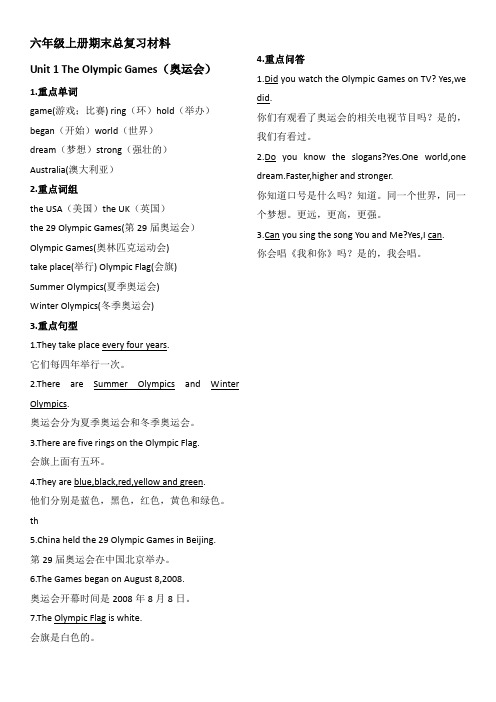
六年级上册期末总复习材料Unit 1 The Olympic Games(奥运会)1.重点单词game(游戏;比赛) ring(环)hold(举办)began(开始)world(世界)dream(梦想)strong(强壮的)Australia(澳大利亚)2.重点词组the USA(美国)the UK(英国)the 29 Olympic Games(第29届奥运会)Olympic Games(奥林匹克运动会)take place(举行) Olympic Flag(会旗)Summer Olympics(夏季奥运会)Winter Olympics(冬季奥运会)3.重点句型1.They take place every four years.它们每四年举行一次。
2.There are Summer Olympics and Winter Olympics.奥运会分为夏季奥运会和冬季奥运会。
3.There are five rings on the Olympic Flag.会旗上面有五环。
4.They are blue,black,red,yellow and green.他们分别是蓝色,黑色,红色,黄色和绿色。
th5.China held the 29 Olympic Games in Beijing.第29届奥运会在中国北京举办。
6.The Games began on August 8,2008.奥运会开幕时间是2008年8月8日。
7.The Olympic Flag is white.会旗是白色的。
4.重点问答1.Did you watch the Olympic Games on TV? Yes,we did.你们有观看了奥运会的相关电视节目吗?是的,我们有看过。
2.Do you know the slogans?Yes.One world,one dream.Faster,higher and stronger.你知道口号是什么吗?知道。
六年级上册英语复资料

六年级上册英语复资料以下是六年级上册英语复习资料,包括一些重点词汇、短语和句子,以及一些常见的语法知识点。
重点词汇:1. subject 科目2. math 数学3. science 科学4. social studies 社会研究5. English 英语6. Chinese 语文7. music 音乐8. art 美术9. physical education 体育10. library 图书馆常见短语:1. have a good day 过得愉快2. see you later 待会儿见3. have a good time 过得开心4. let me know 让我知道5. have a look 看一看6. have a seat 请坐7. what about you 你呢8. I don’t know 我不知道9. I think so 我认为如此10. I’m not sure 我不能确定常见句子:1. What’s your favorite subject? 你最喜欢的科目是什么?2. I like math because it’s fun. 我喜欢数学因为它很有趣。
3. Do you like science? 你喜欢科学吗?4. Yes, I do. 是的,我喜欢。
5. No, I don’t. 不,我不喜欢。
6. What’s your favorite sport? 你最喜欢的运动是什么?7. My favorite sport is basketball. 我最喜欢的运动是篮球。
8. When do you usually get up? 你通常什么时候起床?9. I usually g et up at 7 o’clock. 我通常在7点钟起床。
10. How many hours do you sleep every night? 你每晚睡多少小时?语法知识点:1. 现在进行时:表示正在进行的动作或状态,结构为“be动词+动词ing”。
六年级英语上册期末复习资料
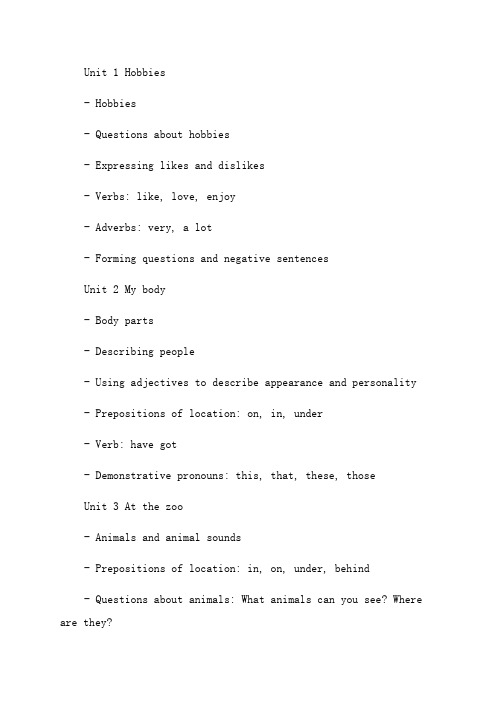
Unit 1 Hobbies- Hobbies- Questions about hobbies- Expressing likes and dislikes- Verbs: like, love, enjoy- Adverbs: very, a lot- Forming questions and negative sentencesUnit 2 My body- Body parts- Describing people- Using adjectives to describe appearance and personality - Prepositions of location: on, in, under- Verb: have got- Demonstrative pronouns: this, that, these, thoseUnit 3 At the zoo- Animals and animal sounds- Prepositions of location: in, on, under, behind- Questions about animals: What animals can you see? Where are they?- Adjectives: big, small, tall, short, long, thin, fat- Singular and plural nouns- Affirmative and negative sentencesUnit 4 At school- School subjects- Classroom objects- Actions: read, write, draw, play, sing, dance, swim, run - Expressing ability: Can you…? Yes, I can. / No, I can’t.- Expressing permission: Can I…? Yes, you can. / No, you can’t.- Ordinal numbers: first, second, third, etc.Unit 5 My house- Rooms in a house- Furniture and household objects- Prepositions of location: in, on, under, behind, next to, in front of- Questions about rooms and furniture: Is there a…? Are there any…?- There is / There are- Adjectives: big, small, old, new, clean, dirtyUnit 6 At the park- Activities at the park: walk, run, play, ride, climb, swing, slide- Prepositions of location: in, on, under, behind, in front of, next to- Questions about activities: What can you do at the park? Where can you…?- Expressing preferences: I prefer… / I don’t like…Unit 7 In the mountains- Geographical features: mountain, river, lake, valley- Activities in the mountains: hike, climb, swim, fish, take photos- Prepositions of location: in, on, under, behind, in front of, next to- Questions about activities: What can you do in the mountains? Where can you…?- Verb: can- Expressing preferences: I prefer… / I don’t like…Unit 8 In Beijing- Places in Beijing: the Great Wall, the Forbidden City, Tiananmen Square- Activities in Beijing: visit, walk, take photos, climb, buy souvenirs- Prepositions of location: in, on, under, behind, in front of, next to- Questions about places and activities: What can you do in Beijing? Where can you…?- Modal verb: can- Expressing preferences: I prefer… / I don’t like…Unit 9 Food and drinks- Food and drinks- Expressing likes and dislikes about food and drinks- Countable and uncountable nouns- Quantifiers: a glass of, a cup of, a bowl of, some- Adjectives: hot, cold, sweet, salty, sour, delicious, tastyUnit 10 Favourite sports- Sport names- Expressing likes and dislikes about sports- Sports equipment- Questions about sports: What sports do you like? What sports can you play?- Verbs: play, do- Expressing abilities: I can… / I can’t…Unit 11 Time for fun- Months and seasons- Expressing likes and dislikes about activities in different seasons- Ordinal numbers: first, second, third, etc.- Adjectives: sunny, cloudy, rainy, snowy, cold, hot, warm, cool- Present simple tense: I read/write/draw…Unit 12 Holidays- Holidays and holiday activities- Questions about holidays: What holiday is in…? What can you do during…?- Adjectives: long, short, fun, boring, interesting- Expressing future plans: I am going to… I will…- Expressing preferences: I prefer… / I don’t like…总结:这个提纲包含了人教版六年级上册所有的重点内容,可以帮助学生复习整个上学期所学的知识点。
(精心归纳总结)六年级英语上册重点知识
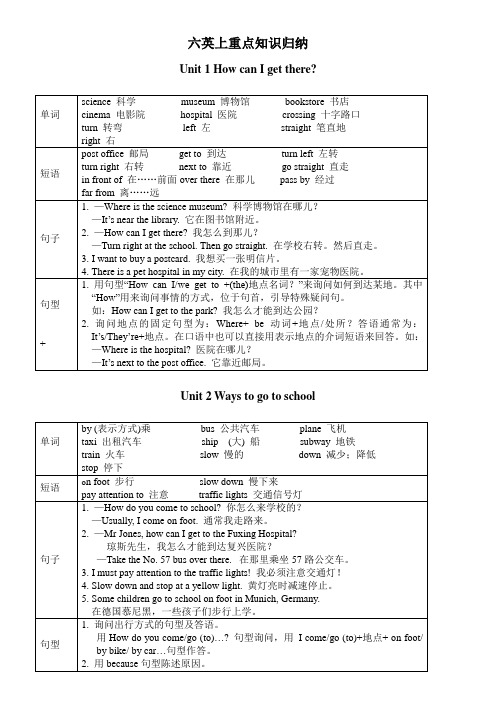
他喜欢猜字谜和远足吗?
—Yes, he does.是的,他喜欢。
句型
1.询问爱好的句型
固定句型:What is/are +one’s+ hobby/hobbies? (……有什么爱好?)
答语:人+like(s) doing…(……喜欢做……)
—She is a nurse.她是一名护士。
2.用句型“Where does+主语(第三人称单数)+work?”询问某人的工作地点。用句型“主语(第三人称单数)+works +(表示地点的)介词短语。”回答。如:
—Where does your father work?你爸爸在哪儿工作?
—He works in a car factory.他在一家汽车工厂工作。
wash clothes洗衣服draw pictures画画
make a snowman堆雪人go for a picnic去野餐
句子
1.—What are you going to do tomorrow?你明天打算做什么?
—I’m going to have an art lesson.我要上美术课。
5. Some children go to school on foot in Munich, Germany.
在德国慕尼黑,一些孩子们步行上学。
句型
1.询问出行方式的句型及答语。
用How do you come/go (to)…?句型询问,用I come/go (to)+地点+ on foot/ by bike/ by car…句型作答。
六年级英语上册期末复习资料

六年级英语上册期末复习资料Unit 1: My Family- Vocabulary: family members, descriptions- Grammar: possessive pronouns, plural nounsUnit 2: My School Life- Vocabulary: school subjects, activities- Grammar: present continuous tense, question words- Exercises: write about daily routines, answer questions, identify correct answersUnit 3: My Hobbies- Vocabulary: hobbies, sports, musical instruments- Grammar: simple present tense, adverbs of frequencyUnit 4: My City- Vocabulary: places in the city, transportation- Grammar: prepositions of place, imperative sentences- Exercises: describe a city, fill in the blanks with prepositions, give directionsUnit 5: Celebrations- Vocabulary: holidays, traditionsUnit 6: Food and Drink- Vocabulary: fruits, vegetables, meals- Grammar: countable and uncountable nouns, imperatives- Exercises: describe favorite food, fill in the blanks with countable or uncountable nouns, give instructionsUnit 7: The Animal World- Vocabulary: animals, habitats- Grammar: present simple tense, subject-verb agreementUnit 8: Our Environment- Vocabulary: nature, pollution, recycling- Grammar: modal verbs, future tense- Exercises: write about ways to protect the environment, fill in the blanks with modal verbs, choose correct future tenseUnit 9: Travel Adventures- Vocabulary: transportation, countries, landmarks- Grammar: present perfect tense, question formationUnit 10: Health and Fitness- Vocabulary: body parts, healthy habits, sports以上是六年级英语上册期末复习资料的大纲。
(完整版)人教版(PEP)小学英语六年级上册复习资料
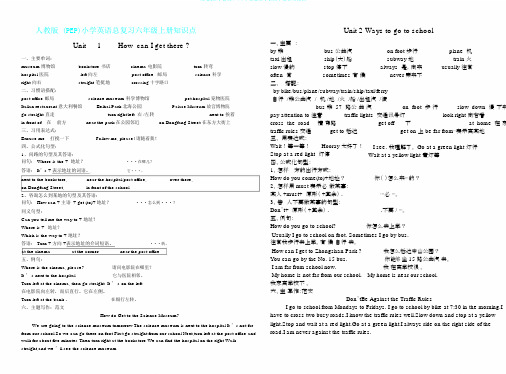
人教版 (PEP)小学英语总复习六年级上册知识点Unit1How can I get there ?一、主要单词:museum 博物馆bookstore 书店cinema 电影院turn 转弯hospital 医院left 向左post office邮局science 科学right 向右straight 笔挺地crossing 十字路口二、习惯语搭配:post office 邮局science museum 科学博物馆pet hospital 宠物医院Italian restaurant 意大利餐馆Beihai Park 北海公园Palace Museum 故宫博物院go straight 直走turn right/left 右 /左转next to 挨着in front of... 在 ...前方near the park 在公园邻近on Dongfang Street 在东方大街上三、习用表达式:Unit 2 Ways to go to school一、主要:by 乘bus 公共汽on foot 步行plane 机taxi 出租ship(大)船subway 地train 火slow 慢的stop 停下always 是,向来usually 往常often 常sometimes 有候never 素来不二、搭配:by bike/bus/plane/subway/train/ship/taxi/ferry自行 /乘公共汽 / 机 /地 /火 /船 /出租汽 /渡bus 乘 57 路公共汽on foot 步行slow down 慢下来pay attention to 注意traffic lights 交通讯号灯look right 向右看cross the road横穿路get off下at home 在家traffic rules 交通get to 抵达get on 上be far from⋯表示离某地Excuse me打搅一下Follow me, please! 请随着我!四、公式化句型:1、问路的句型及其答语:问句: Where is the + 地址?···在哪儿?答语: It’s + 表示地址的词语。
六年级英语上册期末复习资料(人教版六年级上英语全册期末复习提纲)

am 只跟I放在一起be动词 is 主语是单数时用are 主语是复数时用Unit 1 询问一些地点在哪;怎样到达一些地点1.询问地点在哪:Where is the 地点Where is the cinema? 电影院在哪?回答: near(附近)next to(旁边)It’s behind(后面) the 地点in front of(前面)It’s near the zoo. 它在动物园附近。
2. 询问怎样到达一个地点:How can I get to the 地点How can I get there/ here ?How can I get to the cinema? 我怎样到达电影院?回答:turn leftturn right at the 地点 go straightTurn right at the zoo. 动物园右转。
Turn left at the zoo, and then go straight, the cinema is on your left.动物园左转然后直走,电影院在你的左边。
或:You can Take the No.57 bus. 你可以乘坐57路公交车。
人 can take the No.数字 busUnit2 到达一些地点的交通方式doesHow do you go to school? 你怎么去学校?回答:人 go(goes) to school by 交通工具I go to school on foot. She goes to school by bus.2.人 must 动词原形人必须……People on bikes must wear one. 骑自行车的人必须戴一个。
I must pay attention to the traffic lights. 我必须注意交通信号灯。
Unit3 人打算做事1.人 be going to do(动词原形) 人打算(或将要)去做事She is going to see a film. 她打算去看电影。
六年级上册英语复习要点归纳

六年级上册英语复习要点归纳六年级上册英语复习要点归纳人教版引导语:英语的学习需要不断地温故知新,而英语复习要点归纳可以很好帮助学生回顾以往学过的知识。
以下是人教版六年级上册英语复习要点归纳,供大家学习:Unit 1 How do you go to school?一、重点短语:by plane 坐飞机 by ship 坐轮船 on foot步行 by bike 骑自行车by bus 坐公共汽车 by train 坐火车 traffic lights 交通灯 traffic rules交通规则go to school 去上学 get to 到达 get on上车 get off下车Stop at a red light. 红灯停 Wait at a yellow light. 黄灯等Go at a green light. 绿灯行二、重点句型:1.How do you go to school? 你怎么去上学?ually I go to school on foot. Sometimes I go by bus.通常我步行去上学。
有时候骑自行车去。
3.How can I get to Zhongshan Park ? 我怎么到达中山公园?4.You can go by the No. 15 bus. 你可以坐15路公共汽车去。
三、重点语法:1、There are many ways to go somewhere.到一个地方去有许多方法。
这里的ways一定要用复数。
因为there are是There be句型的复数形式。
2、on foot 步行乘坐其他交通工具大都可以用介词by…,但是步行只能用介词on 。
4、go to school的前面绝对不能加the,这里是固定搭配。
5、USA 和US 都是美国的意思。
另外America也是美国的意思。
6、go to the park 前面一定要加the. 如果要去的地方有具体的名字,就不能再加the ,如果要去的地方没有具体名字,都要在前面加the. ( go to school除外。
六年级英语上册复习知识

六年级英语上册复习知识(一)(一)一般现在时1、概念:表示经常性或习惯性发生的动作。
2、标志词:often,usually,sometimes, alaways, every day等3、主语是第三人称单数he, she, it 时,谓语动词要加s或es,其他人称动词要用原形。
4、主语是第三人称单数时,动词变化规则:A、一般情况,在动词后面直接加s,如:walk-walks.B、以sh, ch, o结尾的,在动词后面加es,如:wash-washes,watch-watches, go--goesC、以辅音加y结尾,将y改为i,再加es,如:study-studies.(二)现在进行时:1、概念:表示正在发生的事情或动作。
2、标志词:now, look, listen , it’s……3、结构:b e(am, is , are)+动词ing4、动词加的规则如下:A、一般情况下,在动词后面直接加ing,如:listen-listeningB、以不发音的e结尾,去e加ing,如:take-taking (make, like, write , come)C、以重读闭音节(辅音+元音+辅音)结尾的,要双写最后一个字母再加ing,如put-putting, (get, sit, stop , run, swim, set)但:see-seeing, eat –eating.(三)一般将来时:1、概念:表示将要发生的事或打算,计划要做的事。
2、标志词:this weekend, next Monday, tomorrow, in seven years’ time3、结构:be(am, is , are) going to +动词原形或者 Will+动词原形如:I am going to take a trip next week.4、否定句:be+not going to +动词原形或者 Will+not(等于won’t)+动词原形(四)一般过去时:1、概念:表示在过去的时间里所发生的事或动作。
六年级上册英语复习资料
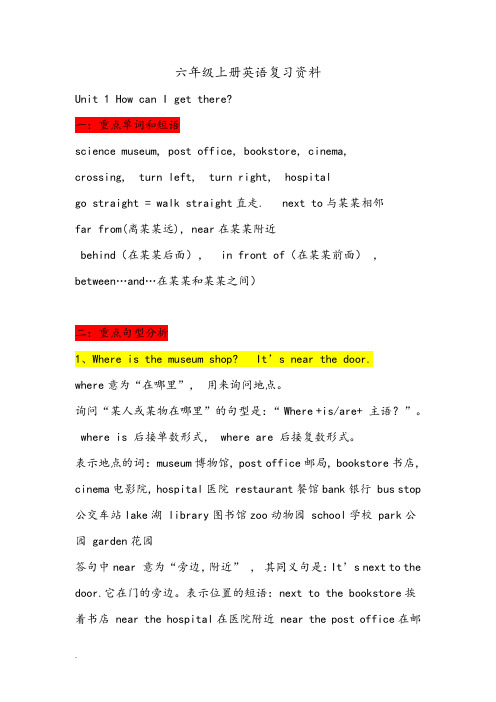
六年级上册英语复习资料Unit 1 How can I get there?一:重点单词和短语science museum, post office, bookstore, cinema,crossing, turn left, turn right, hospitalgo straight = walk straight直走. next to与某某相邻far from(离某某远), near在某某附近behind(在某某后面), in front of(在某某前面),between…and…在某某和某某之间)二:重点句型分析1、Where is the museum shop? It’s near the door.where意为“在哪里”,用来询问地点。
询问“某人或某物在哪里”的句型是:“ Where +is/are+ 主语?”。
where is 后接单数形式, where are 后接复数形式。
表示地点的词:museum博物馆, post office邮局, bookstore书店, cinema电影院, hospital医院 restaurant餐馆bank银行 bus stop 公交车站lake湖 library图书馆zoo动物园 school学校 park公园 garden花园答句中near 意为“旁边,附近” ,其同义句是:It’s next to the door.它在门的旁边。
表示位置的短语:next to the bookstore挨着书店 near the hospital在医院附近 near the post office在邮局附近over there 在那边on Dongfang Street在东方大街上 in front of the school在学校前面2、How can we get there? Turn right at the hospital考查How引导的特殊疑问句,用于提问方式、方法。
六年级英语上册知识点复习汇总
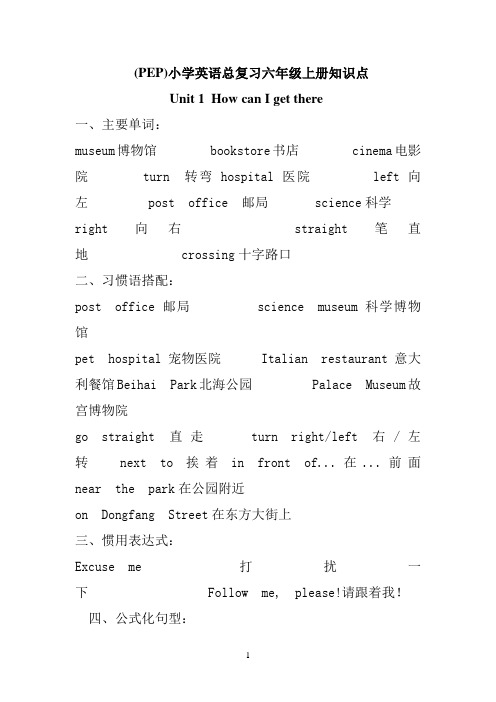
(PEP)小学英语总复习六年级上册知识点Unit 1 How can I get there一、主要单词:museum博物馆bookstore书店cinema电影院turn 转弯hospital医院left向左post office 邮局science科学right向右straight笔直地crossing十字路口二、习惯语搭配:post office邮局science museum科学博物馆pet hospital宠物医院Italian restaurant意大利餐馆Beihai Park北海公园 Palace Museum故宫博物院go straight直走turn right/left右/左转next to挨着in front of...在...前面near the park在公园附近on Dongfang Street在东方大街上三、惯用表达式:Excuse me 打扰一下Follow me, please!请跟着我!四、公式化句型:1、问路的句型及其答语:问句:Where is the + 地点······在哪儿答语:It's + 表示地点的词语(next to the bookstore,near the hospital/post office, over there,on Dongfang Street, infront of the school... )2、询问怎么到某地的句型及其答语:问句:How can +主语+ get (to)+地点·····怎么到·····同义句型:Can you tell me the way to +地点Where is + 地点Which is the way to +地点五、例句:Where is the cinema, please 请问电影院在哪里It's next to the hospital.它与医院相邻。
新PEP小学英语六年级上册复习资料
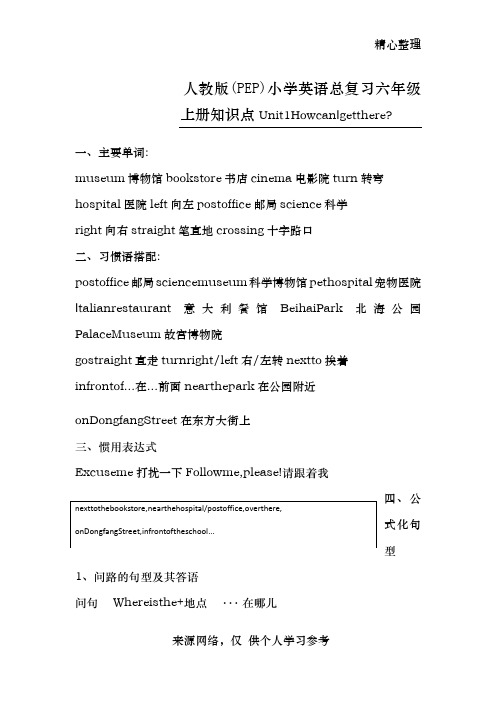
精心整理人教版(PEP)小学英语总复习六年级上册知识点Unit1Howcan I getthere? 一、主要单词:museum 博物馆bookstore 书店cinema 电影院turn 转弯:sciencemuseum talianrestaurantExcuseme 打扰一下 1Whereisthe+nexttothebookstore,nearthehospital/postoffice,overthere,I t’s+表示地点的词语。
它···。
2Howcan+主语+get(to)+the+Canyoutellmethewayto+Whereis+Whichisthewayto+Turn+方向+表示地点的介词短语。
atthecinemaatthecornernearthepostoffice...Whereisthecinema,please?I t’snexttothehospital.它与医院相邻。
Turnleftatthecinema,thengostraight.I t’sontheleft.在电影院向1、Whereisthemuseumshop?博物馆商店在哪里?I t’snearthedoor.他在门附近。
2、Whereisthepostoffice?邮局在哪里?I t’snexttothemuseum.它与博物馆相邻。
3、Whereistherestaurant?餐馆在哪里?I t’snexttothetheparkonDongfangStreet.它与东方街上的公园相邻。
Unit2Waystogotoschoolby乘bus公共汽车onfoot步行plane飞机taxi出租车ship subway地铁train火车slow慢的stop停下always usually通常often经常sometimes有时候never从来不,永不Wait Hooray I see.绿灯行Stopataredlight红灯停Waitatayellowlight1Howdoyoucome(to)+2、如何用must某人+must++.···必须···。
PEP六年级上册英语总复习资料
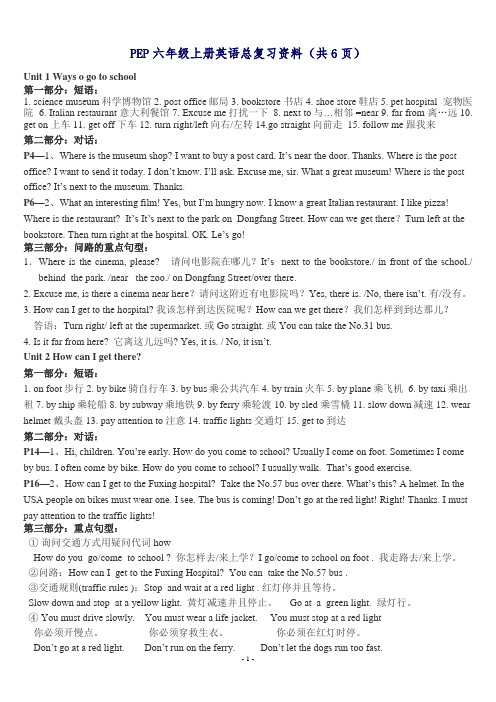
PEP六年级上册英语总复习资料(共6页)Unit 1 Ways o go to school第一部分:短语:1. science museum科学博物馆2. post office邮局 3. bookstore 书店4. shoe store鞋店5. pet hospital 宠物医院 6. Italian restaurant 意大利餐馆 7. Excuse me打扰一下 8. next to与...相邻 =near 9. far from 离 (10)get on 上车11. get off 下车12. turn right/left向右/左转14.go straight向前走 15. follow me 跟我来第二部分:对话:P4—1、Where is the museum shop? I want to buy a post card. It‟s near the door. Thanks. Where is the post office? I want to send it today. I don‟t know. I‟ll ask. Excuse me, sir. What a great museum! Where is the post office? It‟s next to the museum. Thanks.P6—2、Wh at an interesting film! Yes, but I‟m hungry now. I know a great Italian restaurant. I like pizza! Where is the restaurant? It‟s It‟s next to the park on Dongfang Street. How can we get there?Turn left at the bookstore. Then turn right at the hospital. OK. Le‟s go!第三部分:问路的重点句型:1.Where is the cinema, please? 请问电影院在哪儿?It‟s next to the bookstore./ in front of the school./ behind the park. /near the zoo./ on Dongfang Street/over there.2. Excuse me, is there a cinema near here?请问这附近有电影院吗?Yes, there is. /No, there isn‟t.有/没有。
六年级上册英语复习资料
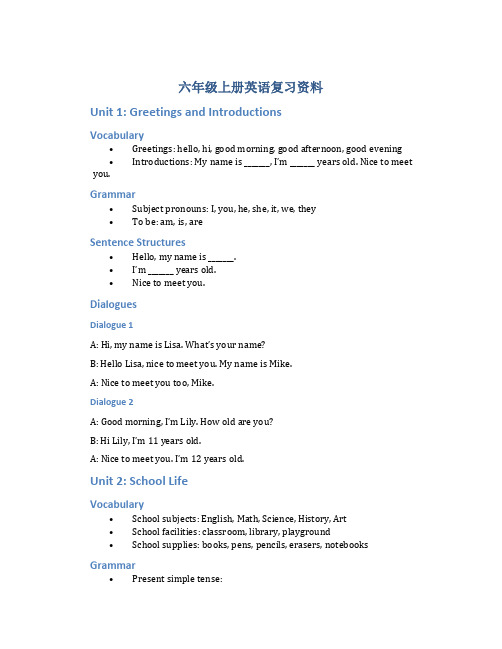
六年级上册英语复习资料Unit 1: Greetings and IntroductionsVocabulary•Greetings: hello, hi, good morning, good afternoon, good evening •Introductions: My name is _______, I’m _______ years old. Nice to meet you.Grammar•Subject pronouns: I, you, he, she, it, we, they•To be: am, is, areSentence Structures•Hello, my name is _______.•I’m _______ years old.•Nice to meet you.DialoguesDialogue 1A: Hi, my name is Lisa. What’s your name?B: Hello Lisa, nice to meet you. My name is Mike.A: Nice to meet you too, Mike.Dialogue 2A: Good morning, I’m Lily. How old are you?B: Hi Lily, I’m 11 years old.A: Nice to meet you. I’m 12 years old.Unit 2: School LifeVocabulary•School subjects: English, Math, Science, History, Art•School facilities: classroom, library, playground•School supplies: books, pens, pencils, erasers, notebooksGrammar•Present simple tense:–Positive: I/You/We/They + verb–Negative: I/You/We/They + don’t + verb–Question: Do + I/You/We/They + verb?Sentence Structures•I like _______.•I don’t like _______.•Do you like _______?DialoguesDialogue 1A: What subjects do you have at school?B: We have English, Math, Science, and History.A: That sounds interesting. Which one is your favorite?B: I like Math the most. What about you?A: I like Science.Dialogue 2A: Do you have any school supplies?B: Yes, I have books, pens, and notebooks.A: Do you like drawing?B: No, I don’t like drawing.Unit 3: Family and FriendsVocabulary•Family members: father, mother, brother, sister, grandparents •Friends: friend, best friend•Adjectives to describe people: kind, funny, smart Grammar•Possessive adjectives: my, your, his, her, our, their Sentence Structures•This is my _______.•He/She is my _______.DialoguesDialogue 1A: Who is the person in the picture?B: This is my mother.A: She looks very kind.B: Yes, she is very kind.Dialogue 2A: Who is your best friend?B: His name is Jack. He is very funny.A: That’s great.Unit 4: Daily ActivitiesVocabulary•Daily routine: wake up, get dressed, eat breakfast, go to school, have lunch, do homework, go to bed•Adverbs of frequency: always, often, sometimes, rarely, never Grammar•Present simple tense:–Positive: He/She/It + verb + s/es–Negative: He/She/It + doesn’t + verb–Question: Does + He/She/It + verb?Sentence Structures•I usually _______.•He/She always _______.•Does she _______?DialoguesDialogue 1A: What time do you usually wake up?B: I usually wake up at 7 o’clock.A: And when do you go to bed?B: I usual ly go to bed at 9 o’clock.Dialogue 2A: Does your brother do his homework every day?B: No, he rarely does his homework.A: Oh, that’s not good.Unit 5: Food and DrinksVocabulary•Food: bread, rice, noodles, chicken, beef, fish, vegetables, fruits •Drinks: water, milk, juice, tea, coffeeGrammar•Countable and uncountable nouns:–Countable: I have two _______.–Uncountable: I have some _______.Sentence Structures•I like eating _______.•I don’t like drinking _______.•Do you like eating _______?DialoguesDialogue 1A: What’s your favorite food?B: My favorite food is pizza.A: That sounds delicious.B: Yes, it’s very tasty.Dialogue 2A: Do you drink milk every day?B: No, I don’t like drinking milk.A: What do you drink then?B: I like drinking juice.ConclusionThis document serves as a review material for the content covered in the first semester of the sixth grade English course. It includes vocabulary, grammar, sentence structures, and dialogues from different units. By studying and practicing these materials, students will be able to reinforce their English language skills and prepare for future lessons.。
人教版小学六年级英语上册知识点总结和复习要点
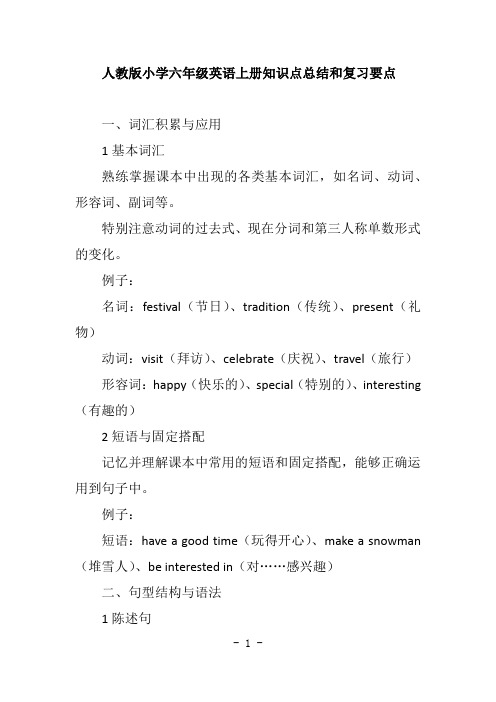
人教版小学六年级英语上册知识点总结和复习要点一、词汇积累与应用1基本词汇熟练掌握课本中出现的各类基本词汇,如名词、动词、形容词、副词等。
特别注意动词的过去式、现在分词和第三人称单数形式的变化。
例子:名词:festival(节日)、tradition(传统)、present(礼物)动词:visit(拜访)、celebrate(庆祝)、travel(旅行)形容词:happy(快乐的)、special(特别的)、interesting (有趣的)2短语与固定搭配记忆并理解课本中常用的短语和固定搭配,能够正确运用到句子中。
例子:短语:have a good time(玩得开心)、make a snowman (堆雪人)、be interested in(对……感兴趣)二、句型结构与语法1陈述句复习并巩固陈述句的基本结构,能够正确构建和表达完整的句子。
例子:陈述句:I like playing football in the afternoon.(我喜欢下午踢足球。
)2疑问句学习和掌握特殊疑问句、一般疑问句及其回答方式,能够准确理解并回答问题。
例子:特殊疑问句:What do you usually do on your birthday?(你生日通常做什么?)回答:I usually have a birthday party with my friends.(我通常和朋友们一起举办生日派对。
)3祈使句巩固祈使句的基本用法,能够正确使用祈使句表达请求、命令或建议。
例子:祈使句:Please don’t forget to bring your homework tomorrow.(请别忘了明天带作业来。
)4时态复习并巩固一般现在时、一般过去时、一般将来时和现在进行时等时态的基本用法和形式。
例子:一般现在时:She often reads books after dinner.(她晚饭后经常看书。
)一般过去时:We went to the zoo last weekend and saw many animals.(我们上周末去了动物园,看到了很多动物。
- 1、下载文档前请自行甄别文档内容的完整性,平台不提供额外的编辑、内容补充、找答案等附加服务。
- 2、"仅部分预览"的文档,不可在线预览部分如存在完整性等问题,可反馈申请退款(可完整预览的文档不适用该条件!)。
- 3、如文档侵犯您的权益,请联系客服反馈,我们会尽快为您处理(人工客服工作时间:9:00-18:30)。
六年级英语上总复习资料Unit 1 询问某个地点在哪;怎样到达某个地点1.询问地点在哪:Where is the +地点Where is the cinema? 电影院在哪?回答:near(附近)next to(旁边)It’s behind(后面)the +地点in front of(前面)It’s near the zoo. 它在动物园附近。
2. 询问怎样到达一个地点:How can I get to the +地点How can I get there/ here ?How can I get to the cinema? 我怎样到达电影院?回答:turn leftturn right at the +地点go straightTurn right at the zoo. 动物园右转。
Turn left at the zoo, and then go straight, the cinema is on your left.动物园左转然后直走,电影院在你的左边。
或:You can Take the No.57 bus. 你可以乘坐57路公交车。
人+can+take the No.数字+ busUnit2 到达某个地点的交通方式1.How do 某人go(come) to school ? 某人怎么去(来)学校doesHow do you go to school? 你怎么去学校?How does she come to school? 她怎么来学校的?回答:某人+ go(goes) + to school + by+ 交通工具come(comes)I go to school on foot. She goes to school by bus.2.某人+ must + 动词原形某人必须……People on bikes must wear one. 骑自行车的人必须戴一个。
I must pay attention to the traffic lights. 我必须注意交通信号灯。
Unit3 某人打算做某事1.某人+be going to +do(动词原形) 某人打算(或将要)去做某事She is going to see a film. 她打算去看电影。
My uncle is going to take a trip. 我叔叔打算去旅行。
My parents are going to go to the supermarket. 我父母打算去超市。
2.本单元几大问句及答句:1)What+be动词+某人+going to do(+时间或地点)?某人打算去做什么What are you going to do tomorrow?What is she going to do next week?回答:某人+be going to do(+时间或地点)I am going to go to the supermarket tomorrow.Sarah and Mike are going to take a trip next week.2)When+be动词+某人+going(+地点)?某人打算什么时候去When are you going (to the cinema)?When are you going (to Beijing)? (地点是城市的名称,前面不用the) 回答:I am going to the cinema tomorrow.They are going to Nanjing next week.3)Where +be动词+某人+going(+时间)?某人打算去哪里Where are you going tomorrow?Where is Sarah going?回答:某人+be going+ to the 地点to Beijing/ to NanjingI am going to the cinema.We are going to the supermarket this morning.4)Who + be 动词+某人+going with? 某人打算和谁一起去Who are you going with?Who is Sarah going with?回答:I’m going with my friends.She is going with her sister.Unit4 询问某人爱好1.What is +某人的+hobby? ……的爱好是什么?What are+某人的+hobbies?回答:某人+like(likes)+动词ing1) -What are your bobbies?-I like sing and dancing.2)-What is his hobby?-He likes reading.2.一般疑问句3.Two students like dancing.One student likes singing. 主语是第三人称单数,动词要加s主语:句子开头表示人的词动词加s的变化规则:1.大部分动词直接加s2.以s, x, sh, ch, o结尾的单词,加es3.辅音字母+ y 结尾的,把y变i再加es辅音字母:除了a, e, i, o, u 以外的字母4.have变成hasUnit5 询问某人职业1.What +do 某人+ do? 某人是做什么的?What +does 某人+ do?What do you do?What does he do?What does your father do?回答:某人+be动词+职业She is a teacher.He is an actor.2.Where do +某人+work? 某人在哪工作?Where does+某人+work?Where do you work?Where does your father work?回答:某人+work/ works+地点He works at sea. She works in a hospital.3.How do 某人go to work? 某人怎么去上班?How does 某人go to work?How do Mike and Sarah go to work?How does your uncle go to work?回答:某人+ go/ goes to work+ 交通方式I go to work by car.He goes to work on foot.4.某人+ want/ wants + to be +职业某人想成为……I want to be a scientist. 我想成为科学家。
She wants to be an engineer. 她想成为一名工程师。
Unit6 谈论某人感受1.They are afraid of him. 他们很怕他。
A be afraid ofB A害怕BMy mother is afraid of mouse. 我妈妈很怕老鼠。
Sarah is afraid of mouse. Sarah很怕老鼠。
I am afraid of mouse. 我很怕老鼠。
2.The cat is angry with them. 猫对他们很生气。
A be angry withB A生B的气The man is angry with the woman. 这个男士对这位女士很生气。
Sarah is angry with Mike. Sarah在生Mike的气。
3.-What’s wrong? 怎么了?-My father is ill. 我爸爸病了。
-What’s wrong?-某人+所处的状况-What’s wrong? 怎么了?-I hurt my right hand. 我的右手受伤了。
4.某人+should+do(动词原形)+其他某人应该……He should see a doctor. 他应该去看医生。
You should wear warm clothes. 你应该穿暖和的衣服。
5.Don’t be sad. 别伤心Don’t be +表示感受的形容词别……Don’t be worried. 别担心Don’t be afraid. 别害怕语法知识1.on the left 在左边on the right 在右边2. A is far from B A离B很远3.about+某事关于……With+某人和某一起4.On+星期几on Sundayin the morningin the eveningin the afternoonin the weekend 在周末5.用a还是an在以a, e, i, o, u开头的单词前用an, 以其他字母开头的单词前用a 6. Two students like dancing.One student likes singing.I like singing.He likes reading books.主语是第三人称单数,动词要加s主语:句子开头表示人的词 动词加s 的变化规则: 1) 大部分动词直接加s2) 以 s, x, sh, ch, o 结尾的单词,加es 3) 辅音字母 + y 结尾的,把y 变i 再加es 辅音字母:除了a, e, i, o, u 以外的字母 4) have 变成has7.He is playing football. 他正在踢足球。
(现在进行时)He is going to play football. 他将要去踢足球。
(一般将来时) 某人+be doing 某人正在做某事 (be 是be 动词,doing 是动词ing 形式) 某人+be going to do 某人将要做某事 (be是be 动词,do 是动词原形) 8.改一般疑问句的步骤:找:be 动词和canShe is a student. 变成: I can swim. 变成: Can you swim?My father is a scientist. 变成:Is your father a scientist? She lives in China. 变成:Does she live in China?My father goes to work by car. 变成:Does your father go to work by car? 9.将陈述句改成否定句的步骤 一、找be 动词和can找到了则直接在be 动词和can 后面加notam ——am not is ——isn ’t are ——aren ’t can ——can ’t 二、没找到在主语后面加don ’t 或doesn ’t 加了doesn ’t ,后面的动词要去掉s例如:He lives in Australia. 变成:He doesn ’t live in Australia. 10.特殊疑问句 1)改特殊疑问句的步骤:一、根据划线部分所表示的含义确定特殊疑问词 She will come back next week. when二、将句子中除了划线部分以外的其他部分变成一般疑问句 She will come back 变成:will she come back 三、将疑问词提到句首 When will she come back?注意:1) 若划线部分就在句首,则不用再把疑问词提到句首了 My father is playing football. who 变成:Who is playing football.找到了没找到。
